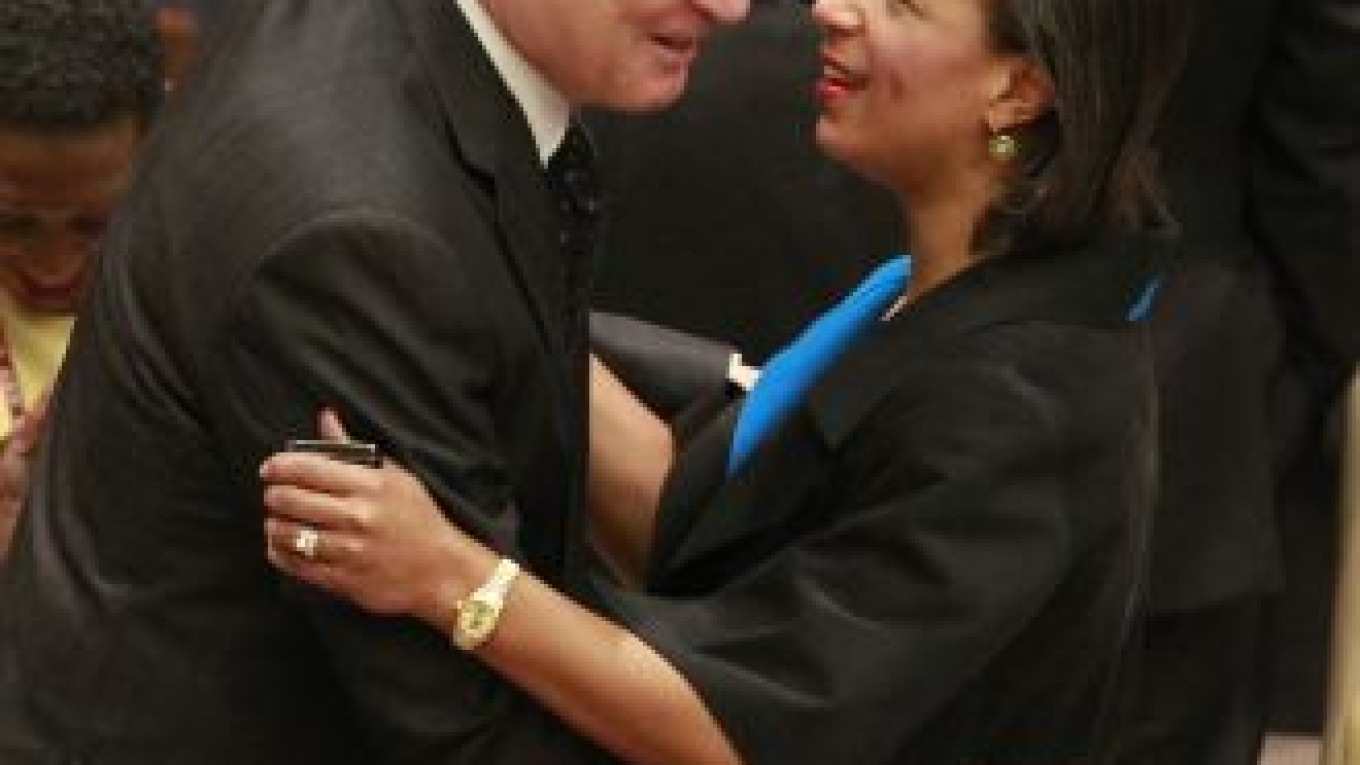UNITED NATIONS — The UN Security Council imposed a fourth round of sanctions on a defiant Iran on Wednesday over a nuclear program the West suspects is aimed at developing the means to build atom bombs.
The 15-nation council passed a resolution that was the product of five months of talks between the United States, Britain, France, Germany, China and Russia. With 12 votes in favor, it received the least support of the four Iran sanctions resolutions adopted since 2006.
The four Western powers had wanted much tougher measures — some targeting Iran's energy sector — but Beijing and Moscow succeeded in diluting the steps outlined in the 10-page resolution.
"This council has risen to its responsibilities. Now Iran should choose a wiser course," U.S. Ambassador Susan Rice told the council after the vote.
Russian Ambassador Vitaly Churkin said sanctions were entirely necessary and that Moscow's building of the Bushehr nuclear power plant was proof that it supported Iran's right to peaceful nuclear energy.
Churkin said the sanctions were a "forced measure, the implementation of which involved a carefully and proportionally weighted approach," Interfax reported.
Iran denies Western allegations that it is seeking nuclear weapons, insisting that its uranium enrichment program is for peaceful energy purposes only.
The resolution calls for measures against new Iranian banks abroad if a connection to the nuclear or missile programs is suspected, as well as vigilance over transactions with any Iranian bank, including the central bank.
It also expands a UN arms embargo against Tehran and blacklists three firms controlled by Islamic Republic of Iran Shipping Lines and 15 belonging to the Islamic Revolutionary Guard Corps. The resolution also calls for setting up a cargo inspection regime similar to one in place for North Korea.
The sanctions rule out the possibility of using force, the Russian Foreign Ministry said.
"All the measures, signed today in the resolution ... exclude the possibility of employing force," the ministry said in a statement on its web site, www.mid.ru.
"Nothing in the resolution's text gives ground for taking measures or actions … including the use of force or the threat of force," it said.
U.S. Defense Secretary Robert Gates said Tuesday that individual states would likely move quickly to pass their own measures that go beyond the UN sanctions.
Annexed to the draft resolution is a list of 40 companies to be added to an existing UN blacklist of firms whose assets around the world are to be frozen on suspicion of aiding Iran's nuclear or missile programs.
The new blacklist includes only one individual, Javad Rahiqi, head of an Iranian nuclear center where uranium is processed. His assets will also be blocked and he will face an international travel ban.
The focus of heated last-minute negotiations, the new blacklist that emerged on Tuesday morning contained 41 firms, including two banks. By the end of the day, China had demanded the deletion of one bank, the Export Development Bank of Iran.
Brazil and Turkey voted against the resolution. Their UN envoys said before the vote that they saw no reason for more sanctions against Tehran.
Turkey and Brazil last month revived parts of a plan brokered by UN nuclear inspectors in October for Tehran to part with 1,200 kilograms of low enriched uranium, or LEU, in return for special fuel rods for a medical research reactor.
They said the deal bolstered the case against sanctions. But the United States, Britain, France and Germany say the deal did nothing to change Tehran's refusal to suspend uranium enrichment in defiance of five Security Council resolutions.
Lebanon had made clear that it was unable to support the resolution because the Iranian-backed militant group Hezbollah is in the government. It abstained in the vote.
Iran's LEU proposal also raised concerns, Russia, France and the United States said in a note to the UN watchdog International Atomic Energy Agency, diplomats said Wednesday.
Iran had proposed to part with no more LEU — potential atomic bomb material if enriched to a very high purity level — than it did under the original October deal, even though its LEU stockpile had almost doubled since then, they said. Iran had also begun refining uranium to a higher level in February.
The first two Iran sanctions resolutions, adopted in 2006 and 2007, passed unanimously. The council approved a third set of sanctions in 2008 with 14 "Yes" votes and one abstention.
Three rounds of punitive measures aimed at Iran's nuclear and missile industries have hit its economy hard but failed to persuade its leadership to halt its nuclear program or come to the negotiating table.
Instead, Iran continues to enrich uranium at increasingly higher levels, despite occasional hints of possible military action against its nuclear sites by Israel or Washington.
Iran's UN ambassador, Mohammad Khazaee, said Tuesday that the push for sanctions showed that some "prefer confrontation" and Iran would react in an "appropriate" way.
A Message from The Moscow Times:
Dear readers,
We are facing unprecedented challenges. Russia's Prosecutor General's Office has designated The Moscow Times as an "undesirable" organization, criminalizing our work and putting our staff at risk of prosecution. This follows our earlier unjust labeling as a "foreign agent."
These actions are direct attempts to silence independent journalism in Russia. The authorities claim our work "discredits the decisions of the Russian leadership." We see things differently: we strive to provide accurate, unbiased reporting on Russia.
We, the journalists of The Moscow Times, refuse to be silenced. But to continue our work, we need your help.
Your support, no matter how small, makes a world of difference. If you can, please support us monthly starting from just $2. It's quick to set up, and every contribution makes a significant impact.
By supporting The Moscow Times, you're defending open, independent journalism in the face of repression. Thank you for standing with us.
Remind me later.


